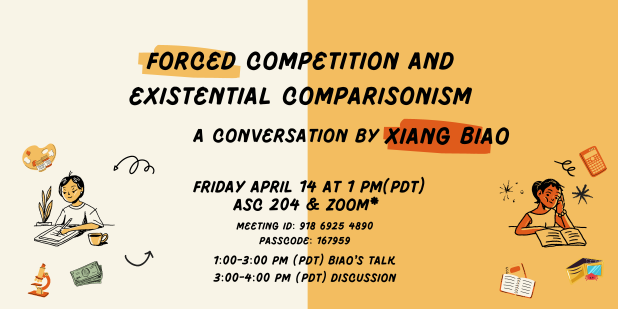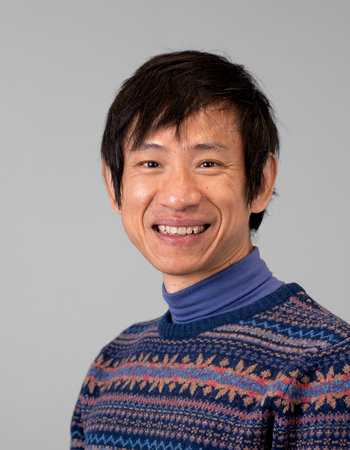Join us for a free one-day workshop for educators at the Japanese American National Museum, hosted by the USC U.S.-China Institute and the National Consortium for Teaching about Asia. This workshop will include a guided tour of the beloved exhibition Common Ground: The Heart of Community, slated to close permanently in January 2025. Following the tour, learn strategies for engaging students in the primary source artifacts, images, and documents found in JANM’s vast collection and discover classroom-ready resources to support teaching and learning about the Japanese American experience.
Forced Competition And Existential Comparisonism - A Conversation By Xiang Biao 项飙 (April 14th, 2023)
Join the discussion! In this conversation, participants are invited to share personal experiences and observations. Xiang will start the conversation by providing a brief history about examination in China.

Location: ASC 204, University of Southern California (Annenberg School for Communication Building on this map)
- 1:00-3:00 PM (PDT) Xiangbiao's talk
- 3:00-4:00 PM (PDT) discussion
 Any society, particularly in its education system, faces the question of how to differentiate members (students) in order to select the suitable candidates for particular positions. Method of differentiation has profound consequences, including the widespread mental stress that young people face in China, the US, and other parts of the world today. In this conversation participants are invited to share personal experiences and observations. Xiang will start the conversation by providing a brief history about examination in China. In the modern times, interpersonal competition based on performance replaced selection based on virtue as the main method of differentiation.
Any society, particularly in its education system, faces the question of how to differentiate members (students) in order to select the suitable candidates for particular positions. Method of differentiation has profound consequences, including the widespread mental stress that young people face in China, the US, and other parts of the world today. In this conversation participants are invited to share personal experiences and observations. Xiang will start the conversation by providing a brief history about examination in China. In the modern times, interpersonal competition based on performance replaced selection based on virtue as the main method of differentiation.
Furthermore, since the 1990s, competition became such a dominant mode of organizing education as well as other domains of social life that many young people constantly and compulsively compare the self to others. Comparisonism is different from competition because comparisonism is often about the incomparable—for instance one works exceedingly hard to outperform a classmate who has richer parents in a maths exam. Such comparisons became widespread as this is how some people establish the sense of self, define one’s relation to the world, and shape one’s daily feelings and actions, thus “existential comparisonism”. In this process, horizontal interpersonal solidarity breakdown in the favour of individuals’ (over)identification to an abstract, totalizing evaluation system.
Here are the materials for participants to read before the talk.
- A video conversation Self as Method
- An interview that explains how Xiang has come up with the common concerns approach
- An earlier short essay reflects on what social theory can do
- A book-length conversation about Xiang’s life and work
- An early experimentation with the “common concerns” approach
Please register via the form below.
Featured Articles
Please join us for the Grad Mixer! Hosted by USC Annenberg Office of International Affairs, Enjoy food, drink and conversation with fellow students across USC Annenberg. Graduate students from any field are welcome to join, so it is a great opportunity to meet fellow students with IR/foreign policy-related research topics and interests.
RSVP link: https://forms.gle/1zer188RE9dCS6Ho6
Events
Hosted by USC Annenberg Office of International Affairs, enjoy food, drink and conversation with fellow international students.
Join us for an in-person conversation on Thursday, November 7th at 4pm with author David M. Lampton as he discusses his new book, Living U.S.-China Relations: From Cold War to Cold War. The book examines the history of U.S.-China relations across eight U.S. presidential administrations.




